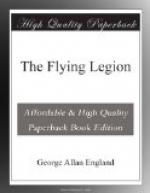“You must ask her if this is real! Unless you both see it, you must not go!”
He paused. “There was a woman, then!” he gasped. “But—where is she now?”
Realization that she had disappeared sobered him. He got up, groped with emaciated hands before his face as he turned back away from the white houses and stumbled eastward.
All at once he saw something white lying on the sand, under a cooking glare of sunlight. Memory returned. He fell on his knees beside the woman and caught her up in quivering arms.
After a while, he noticed there was blood on her left arm. Blood, in the bend of the elbow, coagulated there.
This puzzled him. All he could think was that she might have cut herself on her jambiyeh, when she had fallen. He did not know then, nor did he ever know, that he himself had fallen at this spot; that she had thought him dying; that she had tried to cut her arm and give him her blood to drink; that she had fainted in the effort. Some last remnants of strength welled up in him. He stooped, got her across his shoulder, struggled to his feet and went staggering up the dune.
Here he paused, swaying drunkenly.
Strange! The very same mirage presented itself to his eyes—blue sails, turquoise sea, feathery palms, white houses.
“By God!” he croaked. “Mirages—they don’t last, this way! That’s real—that’s real water, by the living God!”
Up from dark profundities of tortured memory arose the cry of Xenophon’s bold Greeks when, after their long torment, they had of a sudden fronted blue water. At sight of the little British consular station of Batn el Hayil, on the Gulf of Farsan:
“Thalassa!” he cried. “Thalassa, thalassa!” (The sea, the sea!)
CHAPTER LIII
THE GREATER TREASURE
New York, months later.
Spring had long departed—the spring of the year in which the Eagle of the Air had flung itself aloft from the Palisades, freighted with such vast hopes.
Summer was past and gone. The sparkling wine of autumn had already begun to bubble in the cup of the year.
Sunset, as when this tale began. Sunset, bronzing the observatory of Niss’rosh, on top of the huge skyscraper.
Two of the Legionaries—a woman and a man—were watching that sunset from the western windows of that room where first had been conceived the wonder-flight which had spelled death for so many a stout heart.
You could see great changes had come upon the man, as he paced slowly up and down the singular room, hands deep in the pockets of his riding-trousers. His hair was grayer, for one thing, his face leaner; a certain sinewy strength had come to him that had not been there before.
Some marks of suffering still remained on him, that not all of life could take away. His eyes looked deeper and more wise, his mouth more human in its smile. That he had learned to smile, at all, meant much. And the look in his eyes, as he glanced at the woman, meant vastly more. Yes, this man had learned infinitely much.




